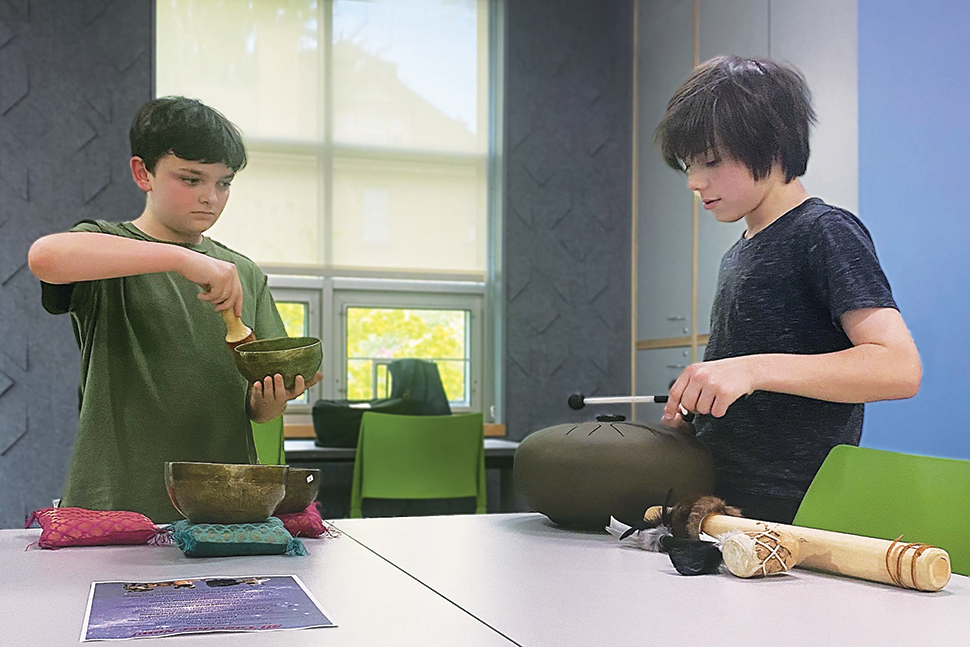Tranquil Tones

After talking with students who were grappling with mental health challenges, Katie Donahoe wanted to do something to help.
Donahoe, teen librarian at Mt. Lebanon Public Library (MLPL) in Pittsburgh, says that many elementary, middle, and high school students who visited the library would express that they were dealing with stress and anxiety issues. She wanted a different way of introducing “mindfulness or stress relief for this age group that’s not something you can learn in health class,” she says. “Something that’s just really out there.”
In fall 2022, Donahoe began hosting sound bath sessions, advertised for grades 6 and up, twice a month. These sessions, also known as sound therapy or sound healing, typically involve participants lying down while an instructor uses musical instruments like singing bowls and gongs to create sound waves that calm participants’ central nervous systems. Proponents say this leads to relaxation and healing throughout the body. Instructors are typically certified sound bath practitioners who have a background in alternative physical therapy or an interest in meditative practices.
Sound baths are now a growing service trend among public libraries across the US. “It’s one of those practices that can be a personal spiritual experience, but you’re also in a room full of people,” says Gao Yang, community partnerships and programs coordinator at St. Paul (Minn.) Public Library (SPPL), who hosted a sound bath session earlier this year. “I think that is really special.”
‘Uplifted and refreshed’
Some scientific studies have made the connection between sound meditation practices and positive outcomes for the mind and body. A 2016 study reported that participants felt decreased levels of stress and pain after a session. “Those health benefits are wonderful,” says Sarah Greenberg, adult services coordinator at Buena Vista (Colo.) Public Library (BVPL), which hosted a session in spring. “But then it also [offers a] spirit of community and meeting new people and making new friendships.”
Licensed massage therapist Kearsty Bogenrief led BVPL’s sound bath session using tuning forks, metal instruments that produce different vibrational frequencies, which she says helps balance energy in and outside of the body.
The program attracted about 15 attendees, Greenberg says—and because of positive feedback, BVPL is considering offering it quarterly. Bogenrief teaches other meditative classes at BVPL and says the library is an unintimidating setting to introduce patrons to these unique practices. “People feel comfortable and safe in their local library, so it doesn’t feel scary or weird,” she says. “Yoga studios or fitness centers can be scary to some people.”
“Any kind of economic access to health care in our current society—let alone to more alternative therapies—is so limited.” Katie Donahoe, teen librarian at Mt. Lebanon Public Library in Pittsburgh
SPPL’s session in March was a part of the library’s annual Read Brave program. The community reading program includes five books, all focused on a single theme. The theme for 2023’s program was mental health, and one featured title was My Grandmother’s Hands by Resmaa Menakem, which looks at how trauma and mental health struggles can also affect physical health.
This message, Yang says, inspired her to contact singer Peggy Jiang and her sister Nancy Jiang, who specialize in reiki, a healing practice that uses gentle touch to help alleviate stress. The session garnered positive reviews, Yang notes.
“What I saw happen at the program was that it really reduced people’s anxiety,” Yang says. “They felt like they were uplifted and refreshed.”
Tapping into emotions
MLPL’s sound bath sessions take place in the afternoon following the end of the school day and last about 45 minutes. Donahoe says about 15–20 students attend each session. They work with Karen Romano, owner of Inner Light, a local wellness business that specializes in sound healing.
During one session, Donahoe recalls a 13-year-old patron was brought to tears within the first five minutes. Although the boy said he did not know what made him cry, Romano told Donahoe that people can get deeply in touch with their emotions during sound baths, causing different reactions.
The attendee’s response to the session was “really fascinating and definitely said something about what [Romano] is doing,” Donahoe says.
For library workers interested in providing similar programming, Donahoe encourages them to research local businesses or practitioners for potential partnerships. She didn’t know her community had these offerings until a colleague mentioned it to her. “Any kind of economic access to health care in our current society—let alone to more alternative therapies—is so limited,” Donahoe says. “To have a library be an opportunity for someone to learn about some of this stuff and experience it for the first time and have it be free of charge, that’s very important to me from an economic and health justice standpoint.”
Source of Article